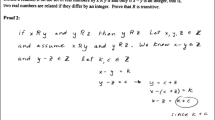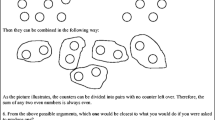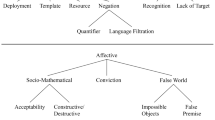Abstract
This paper deals with writing a proof text as the final step of the proving process at university level, particularly when it results in a disorganized, unclear draft. The reported study concerns third year university students when dealing with proof tasks for which the proving process has to be built up, as opposed to tasks that students may tackle by known proving procedures. By comparing the analysis of students’ proof texts with their interview responses, a strong influence of the didactic contract, lack of meta-knowledge about proof, and a weak mastery of concepts were identified as possible reasons for the poor quality of the proof texts. Some educational implications and hints for further research are provided.
Similar content being viewed by others
Notes
The oral language in Algeria, a descendant of classic Arabic with many words and expressions from different languages (French, Italian, Spanish, Turkish…).
References
Baker, D., & Campbell, C. (2004). Fostering the development of mathematics thinking: Observations from a proofs course. Primus: Problems, Resources, and Issues in Mathematics Undergraduate Studies, 14(4), 345–353.
Boero, P., Douek, N., & Ferrari, P. L. (2008). Developing mastery of natural language. Approaches to some theoretical aspects of mathematics. In L. English (Ed.), International handbook of research in mathematics education (pp. 262–295). New York, NY: Routledge.
Brousseau, G. (1988). Le contrat didactique: le milieu. Recherche en Didactique des Mathématiques, 9(3), 309–336.
Cummins, J. (1984). Bilingualism and special education. Clevedon, UK: Multilingual Matters.
Dreyfus, T. (1999). Why Johnny can’t prove. Educational Studies in Mathematics, 38(1), 85–109.
Guala, E., & Boero, P. (2017). Cultural analysis of mathematical content in teacher education: The case of elementary arithmetic theorems. Educational Studies in Mathematics, 96(2), 207–227.
Halliday, M. A. K. (1985). An introduction to functional grammar. London, UK: Arnold.
Harel, G., & Sowder, L. (1998). Students’ proof schemes. Results from exploratory studies. In A. Schoenfeld, J. Kaput, & E. Dubinsky (Eds.), Research on collegiate mathematics education, III (pp. 234–283). Providence RI: AMS.
Lew, K. (2016). Conventions of the language of mathematical proof writing at the undergraduate level. PhD thesis. New Brunswick, NJ: Rutgers University.
Mamona-Downs, J., & Downs, M. (2009). Necessary realignments from mental argumentation to proof presentation. In V. Durand-Guerrier, S. Soury-Lavergne, & F. Arzarello (Eds.), Proceedings of the 6th congress of the European Society for Research in Mathematics Education (pp. 2336–2345). Lyon, France: INRP.
Moore, R. C. (1994). Making the transition to formal proof. Educational Studies in Mathematics, 27(3), 249–266.
Morselli, F. (2007). Sui fattori culturali nei processi di congettura e dimostrazione. PhD Thesis. Torino, Italy: Università degli Studi.
Pedemonte, B. (2007). How can the relationship between argumentation and proof be analysed? Educational Studies in Mathematics, 66, 23–41.
Raman, M., Sandefur, J., Birky, G., Campbell, C., & Somers, K. (2009). “Is that a proof?”: An emerging explanation for why students don't know they (just about) have one. In V. Durand-Guerrier, S. Soury-Lavergne, & F. Arzarello (Eds.), Proceedings of the 6th congress of the European Society for Research in Mathematics Education (pp. 301–310). Lyon, France: INRP.
Sarrazy, B. (1995). Le contrat didactique. Revue Française de Pédagogie, 112, 85–118.
Schoenfeld, A. H. (1988). Problem solving. In P. J. Campbell & L. S. Grinstein (Eds.), Mathematics education in secondary schools and two-year colleges: A source book (pp. 81–96). New York, NY: Garland Publishing Inc.
Schoenfeld, A. H. (1992). Learning to think mathematically: Problem solving, metacognition and sense making in mathematics. In D. Grows (Ed.), Handbook for research on mathematics teaching and learning (pp. 334–370). New York, NY: Macmillan.
Selden, A., & Selden, J. (2003a). Validations of proofs considered as texts: Can undergraduates tell whether an argument proves a theorem? Journal of Research in Mathematics Education, 34(1), 4–36.
Selden, A. & Selden, J. (2003b). Errors and misconceptions in college level theorem proving. Tech report no. 2003–3. Cookeville, TN: Tennessee Tech University.
Selden, A. & Selden, J. (2007). Overcoming students’ difficulties in learning to understand and construct proofs. Tech report no. 2007–1. Cookeville, TN: Tennessee Tech University.
Selden, A. & Selden, J. (2013). The genre of proof. Tech report no. 2013–1. Cookeville, TN: Tennessee Tech University.
Vergnaud, G. (1990). La théorie des champs conceptuels. Recherches en Didactique des Mathématiques, 10(23), 133–170.
Weber, K. (2001). Student difficulty in constructing proofs: The need for strategic knowledge. Educational Studies in Mathematics, 48(1), 101–119.
Weber, K. (2004). A framework for describing the processes that undergraduates use to construct proofs. In M. Johnsen Høines & A. B. Fuglestad (Eds.), Proceedings of the 28th conference of the International Group for the Psychology of Mathematics Education (Vol. 4, pp. 425–432). Bergen, Norway: PME.
Weber, K. (2015). Mathematics professors and mathematics majors’ expectations of lectures in advanced mathematics. [Blog post.] from http://blogs.ams.org/matheducation/2015/02/10/mathematics-professors-and-mathematics-majors-expectations-of-lectures-inadvancedmathematics/. Accessed 10 Jan 2017.
Zill, D. G., & Shanahan, P. D. (2003). A first course in complex analysis with applications. Sudbury (MA): Jones and Bartlett Publishers. from https://mariosuazo.files.wordpress.com/2013/08/dennis_zill_a_first_course_in_complex_analysis_wbookfi-org.pdf. Accessed 20 Dec 2017
Author information
Authors and Affiliations
Corresponding author
Additional information
Publisher’s note
Springer Nature remains neutral with regard to jurisdictional claims in published maps and institutional affiliations.
Rights and permissions
About this article
Cite this article
Azrou, N., Khelladi, A. Why do students write poor proof texts? A case study on undergraduates’ proof writing. Educ Stud Math 102, 257–274 (2019). https://doi.org/10.1007/s10649-019-09911-9
Published:
Issue Date:
DOI: https://doi.org/10.1007/s10649-019-09911-9




